The Healthcare industry is one of the most innovative sectors and is currently experiencing rapid advancement. So, the Intellis executive team spent last week meeting leaders at the annual HIMSS conference, a pivotal health IT event held in Orlando. The conference brings together over 45,000 health IT professionals, clinicians, executives, vendors, and patient advocates from around the world.
The Future of Healthcare at HIMSS
The excitement at the event was palpable, and the Intellis team left feeling inspired by the dedication and achievements of the many leaders in this rapidly growing industry who are transforming healthcare delivery. Here, we discuss the most exciting takeaways from this year's event and how they impact Healthcare Facilities Management.
.png?width=2836&name=MicrosoftTeams-image%20(3).png)
Panoramic view of the Orange County Convention Center.
The Ethics of Artificial Intelligence in Healthcare
"Ethics guardrails will be an imperative for the impactful growth of AI in clinical health." -Hemant Pathak, Associate General Counsel, Microsoft.
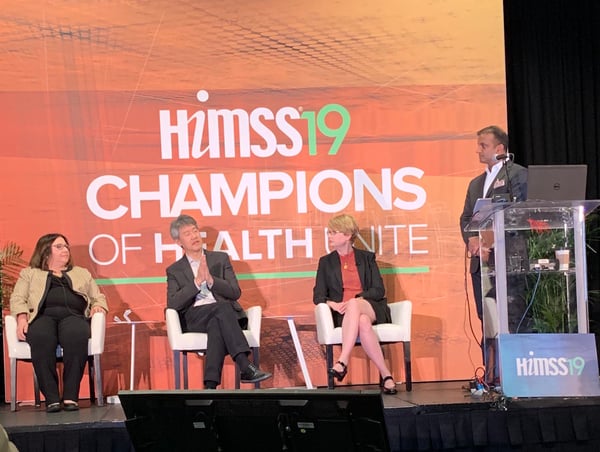
From left Sylvia Trujillo of the American Medical Association, Peter Lee of Microsoft Research, Dr. Susannah Rose of Cleveland Clinic, and moderator Hemant Pathak, Associate General Counsel, Microsoft
One of the most discussed topics this year was the ethics of Artificial Intelligence, and how it will impact the healthcare industry. The panel stressed that technologies such as AI, machine learning and cognitive services will need to be ethnically compliant. The technology, insurers and patients will need to keep ethics in mind when considering AI.
Why Condition Assessments are Important for Healthcare Facilities.
Digital Data Revolution in Healthcare
"Data sharing will drive the next generation of cures - we need more usable magic.” -Christopher Ross, CIO, Mayo Clinic
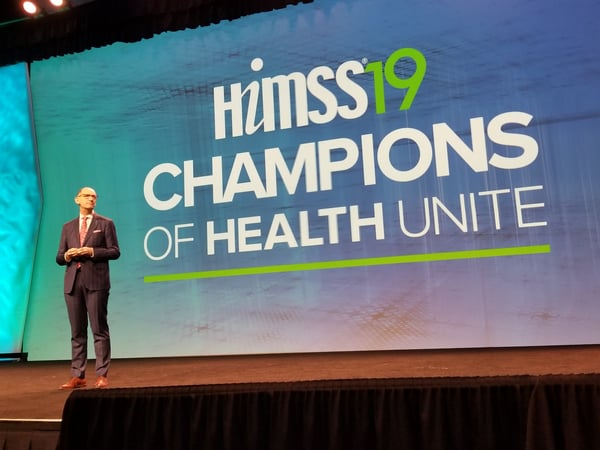
Dr. Christopher Ross delivers an opening keynote at HIMSS.
HIMSS opened with an emotional and inspiring keynote from Dr Christopher Ross who described his journey from CIO to cancer patient and back again.
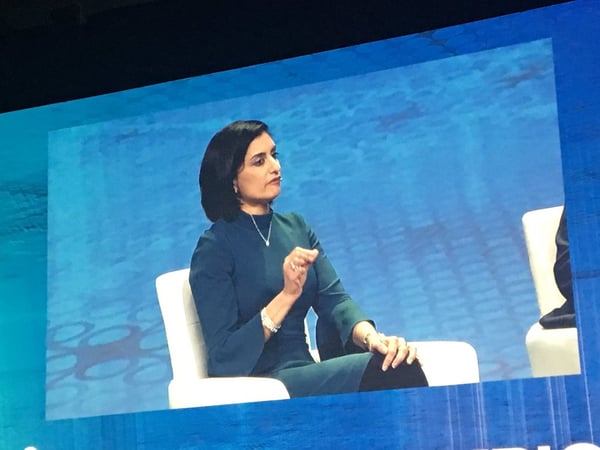
Seema Verma speaking about the data revolution in healthcare at HIMSS.
“We have all this complete data in an era of AI, imagine what we can do with all that data in terms of research, in terms of developing new cures and treatments.” Seema Verma, Administrator for the Centers for Medicare & Medicaid Services (CMS).
How Mergers and Acquisitions Impact Healthcare Facilities.
Mobile Technology Continues to Drive Transformation
Mobile data-collection technology empowers healthcare facility managers in many ways, including managing work process flows, tracking physical assets, and supervising building facilities. Mobile solutions support healthcare professionals by reducing costs, improving quality and outcomes and increasing patient and provider satisfaction.
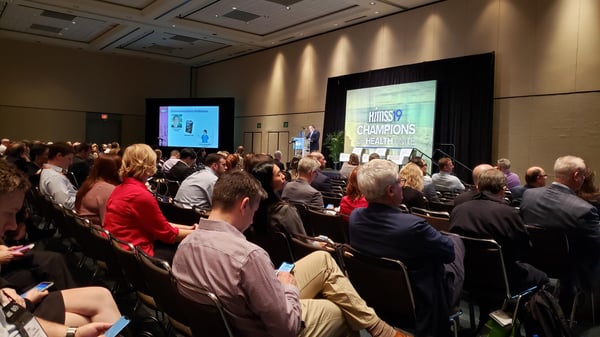
Packed session on Smartphones and healthcare.
Hospitals and health systems are making large-scale, enterprise-wide investments in smartphones and unified communications solutions to drive clinical transformation and address the mission—and patient-critical communications requirements of clinical and non-clinical mobile workers within the hospital and across the care continuum.
How Changes in Healthcare Impact Facilities Management.
Augmented Reality for Global Healthcare Delivery and Training
"Through simple, everyday devices that we take for granted, we can really do miraculous things." -Dr. Nadine Hachach-Haram of Proximie
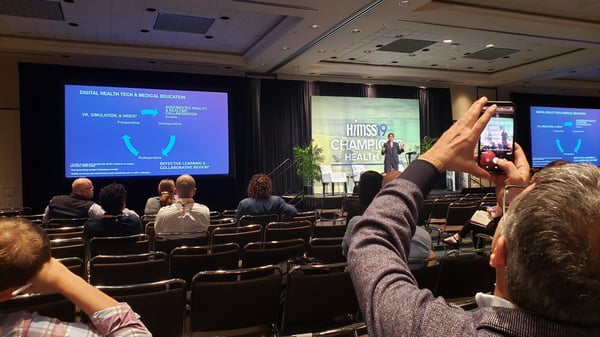
Dr. Nadine Hachach-Haram presents on how AR can transform surgery.
Augmented Reality and Healthcare might sound like an odd-ball match, but Dr. Nadine Hachach-Haram of Proximie gave a compelling presentation on how this emerging tech has the potential to revolutionize the way medical professionals, learn, communicate and care for patients.
The Power of Machine Learning and Artificial Intelligence to Improve Patient Outcomes
"Data is only as powerful as the ground truth, annotation, clinical insights that you layer on top of that... the most powerful AI is delivered invisibly, seamlessly." -Karley Yoder, GE Healthcare
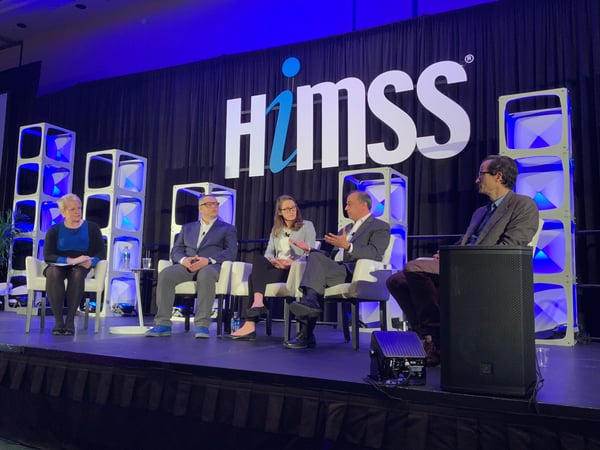
From left: Susan Dentzer, President And CEO, Network For Excellence In Health Innovation; Taha Kass-Hout, MD, MS, Amazon; Karley Yoder, Product Manager, GE Healthcare; Manu Tandon, Chief Information Officer, Beth Israel Deaconess Medical Center; and Arien Malec, SVP R&D, Network, Change Healthcare.
Data science is quickly becoming a key component in supporting a digitally enhanced, data-driven healthcare industry. Healthcare organizations are leveraging novel machine learning capabilities and solutions for clinical applications and achieving more accurate and efficient results to improve patient outcomes.
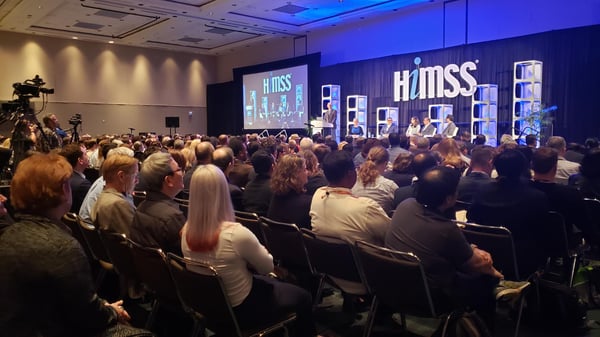
Education session: Using Machine Learning to Drive Innovation-Driven Healthcare
Across a number of modalities (image, voice, etc.), machine learning and artificial intelligence are being applied to various tasks in healthcare to derive new actionable insights from the growing amount of structured and unstructured data in clinical settings and support precision health.
The Future of Healthcare Facilities
The healthcare industry is clearly experiencing a major digital transformation. Healthcare institutions with complex operations that seek to future-proof their building systems and capital investments should employ a facility optimization strategy powered by innovative facility management software such as FOUNDATION.
From procurement to facility condition assessments, facility management, and capital planning, Intellis solutions bring best-in-class engineering efficiency to the modern health environment.


